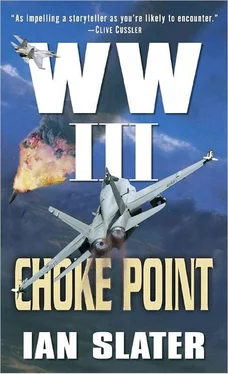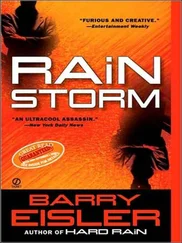“Holy shit!” said Brentwood’s driver.
By the time General Freeman had exited the woods, in such haste that he’d forgotten to zip up, Washington, D.C., government switchboards, particularly those of Homeland Defense headquarters, were jammed by terrified callers. What in hell was the government doing about it, and what about the nuclear reactors on the Aegis? If the Aegis had been “blown apart,” as CNN said, didn’t that mean its reactor had disintegrated as well? And if so, wasn’t there immediate danger of fatal radiation through the entire Northwest?
For the first time since the American Civil War, Americans began a massed exodus, only this time from the Pacific Northwest, something their Founding Fathers couldn’t possibly have envisaged. En route, they swallowed iodine capsules in the hope that it would either prevent or at least offset what many feared would be the beginning of a massive cancer pandemic triggered by deadly radiation. AMERICANS ON THE RUN tabloids from Damascus to Paris trumpeted, the most sympathetic foreign headlines coming from Australia, Britain, New Zealand, and Canada. Most European papers, after expressing horror at the destruction of yet another American “superwarship” and lamenting the loss of all aboard, quickly resorted to tarted-up versions of the old “root causes,” “blame the Americans” harangues of post-9/11.
Going against the tide of frightened Americans, Freeman, having taken his leave of Aussie and Brentwood, returned to Port Angeles, the repaired Darkstar due to take off at 11:37 P.M.. Booting up his laptop, he saw a flickery blue screen. No pictures, however. “Darkstar, my ass!” he thundered so loudly his Port Townsend hotelier heard him from the lounge. “Dark crap is more like.”
Then the infrared feed came through.
“All right, then,” Freeman said gruffly.
Against the infrared’s grayish coast he could see bubbling, dime-sized, whitish hotspots and fishing boats’ exhaust heat. “You’ve got balls!” he told the screen, referring to the fishermen. “Three ships sunk and you guys are still trawling for dogfish. I’ll be—”
Wait a minute, he thought. Fish . Naval slang for torpedoes. Were the terrorists on trawlers as well? One eye on his computer screen, Freeman turned to the phone, punching in the numbers for Coast Guard Coordination in Seattle, alerting them to the possibility of trawlers and other fishing vessels — factory ships, perhaps — having torpedo-firing and/or mine-laying capacities.
When the Coast Guard commander got a chance to interject, which, given the general’s rapid delivery, was not for a full two minutes, he told Freeman, “General, that was the first thing our divers and boarding parties looked for— above and below waterline. We also checked all the Beaufort drums on deck to make sure they contained life rafts and not mines. We were also looking for terrorists.”
“Oh,” responded the legend, answering, as if he was a member of the British General Staff rather than a retired American warhorse, “Good show, Commander.”
“Yes,” said the commander. “Not all of our members are retired!”
“What in hell does that mean?” growled Freeman.
“Have to go, General. We’re running escort for the Navy’s pullback into Puget.” The commander hung up.
“Hello?” thundered Freeman. “Hello? You cheeky son of a bitch!” He turned to the laptop, and above its screen caught a glimpse of himself in the motel room’s mirror. He hadn’t thought about the possibility of Beaufort life raft drums being used as mine containers. “Huh,” he said, looking at his reflection. “Not so damn smart after all, eh, General?”
Watching Darkstar’s feed, he could see more bobbing, dime-sized white spots contrasted against the serrated-gray-wall coastline and the huge Olympic land mass beyond.
Where the lingering warmth of the land, released from the base of Mount Olympus, met the radiant heat of the cooler ocean, fog had formed. It now began permeating the myriad nooks and crannies and wider bays all the way from Port Angeles west to the violent surf of Tatoosh Island off Cape Flattery.
As the big Pacific swells exhausted themselves, crashing in punishing waves of foam against the black, precipitous cliffs of Tatoosh, Freeman could hear the mournful sounds of foghorns through Darkstar’s amplified sound feed. Darkstar’s bottom screen text informed him that Tatoosh was one of the most densely populated wild bird sanctuaries in the world. But right now the general couldn’t have cared less about the sanctuary or any of the others situated south of Cape Flattery down the Washington coast as far south as Cape Disappointment, off the equally dramatic Oregon coast. Instead, his attention was confined strictly to Darkstar’s present east-west feed, the UAV’s pictures coming in from its low vectored flight between Port Angeles and Tatoosh. They were speckled with more than a dozen hotspots in what were supposedly unpopulated areas. By the time Darkstar reached the end of its flight path just west of Tatoosh, its IR feed became thicker with hotspots. These were smaller than the bobbing hotspots of fishing vessels’ radar masts and the like but appeared to the general significantly more numerous.
The phone jangled.
“Freeman!”
It was David Brentwood calling to ask if he had more details, via Darkstar, about the explosion. The officers’ mess at Fort Lewis, he explained, was a hive of contradictory rumors, CNN camera-equipped choppers from the news networks apparently not yet on the scene. Some were saying CNN’s crews were chickening out because of the fear of radiation.
The general, concerned as he was by the sudden increase in the number of hotspots on the IR feed, was nevertheless encouraged by Brentwood’s tone. He knew that curiosity about the world beyond oneself was a sign of recovery from post-traumatic stress disorder. Perhaps with Aussie’s help Brentwood had finally accepted the hard truth that he was finished, not only in SpecOps but for the regular forces as well. Surely the Medal of Honor winner now realized how downright irresponsible it would be for any commander, extant or retired, to send an injured man into combat, endangering the lives of all those around him because of his handicap — or what, Freeman thought, politically correct reporters would call his “limb-challenged” ability. Even worse, in the general’s view, would be the danger posed to David’s comrades’ by their preoccupation with his safety rather than with the mission objective.
“David,” the general said, “I’d like you and Aussie to get up here to Port Angeles. Salvini and Choir are due momentarily. Tell Aussie to bring his Draeger.”
“Roger that,” said David. “I’ll bring mine too.”
There was silence on the general’s end.
“Can you hear me, General?”
“What? Ah, yes, yes. Bring your tank. Sorry — I’m glued to an IR printout of the coast,” said the general, and seeing the hotpots multiplying, added. “Could do with you boys’ advice on this. Something strange going on.”
“Metal debris from the destruction of the Aegis?” suggested Brentwood. “Lot of it would still be pretty hot even in the sea.”
“Some of that in the sea, I agree. But this is all over the place. On Tatoosh Island?”
“Where’s that?”
“Bird sanctuary. No one allowed near it but our UAV. It’s showing hundreds of hotspots. Like damned confetti.”
“Is this Toosh Island anywhere near where the Aegis blew up?”
“No. Much further west. ’Course, most of the hotspots I’m seeing could be body heat from the thousands of birds. Got every species here from little stormy petrels to giant albatross. But there’s other stuff too — bigger’n damn houses — along supposedly unpopulated stretches of the coast.”
Читать дальше












